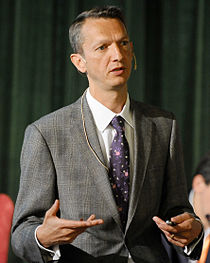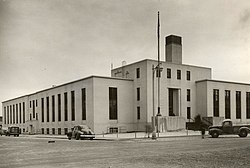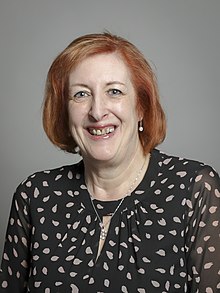Andy Haldane
Andy Haldane | |
|---|---|
 Haldane in Trento, Italy in 2013 | |
| Born | 18 August 1967 Yorkshire, England |
| Nationality | British |
| Education | Guiseley School |
| Alma mater | University of Sheffield University of Warwick |
| Occupation | Economist |
Andrew G. Haldane, FAcSS FRS (/ˈhɔːldeɪn/; born 18 August 1967) is a British economist who worked at the Bank of England between 1989 and 2021 as the chief economist and executive director of monetary analysis and statistics.[1] He resigned from the Bank of England in June 2021 to become chief executive of the Royal Society for Arts.[2]
In 2014 he was named by Time magazine as amongst the world's 100 most influential people.[3]
Education
Born in Yorkshire,[4] Haldane attended Guiseley School in north Leeds.[5] He did not study maths at A-level, teaching himself; he said that he was "very far from being natural at maths" and struggles teaching his children the subject.[6] He received a BA in economics from the University of Sheffield in 1988 and an MA in economics from the University of Warwick in 1989.[5]
Career
Haldane joined the Bank of England in 1989. He worked in monetary analysis, on various issues regarding monetary policy strategy, inflation targeting, and central bank independence. He had a secondment to work at the International Monetary Fund. Haldane's senior experience back in the Bank of England includes heading up the International Finance Division and the Market Infrastructure Division. In 2005 Haldane assumed responsibility for the Systemic Risk Assessment Division within the Financial Stability department. In 2009 he became the Bank of England's executive director of financial stability.[1][7]
Haldane has been widely cited as a leading Bank of England expert on financial stability[8][9][10] and is a co-author with Adair Turner and others of the London School of Economics The Future of Finance report.[11] His 2012 speech, called "The Dog and the Frisbee"[12]—delivered to the Federal Reserve Bank of Kansas City's annual Jackson Hole, Wyoming meeting—received widespread attention in the financial media[13] and prompted Forbes to describe him as a "rising star central banker".[14] In the speech, Haldane drew on behavioural economics to argue that complex financial systems cannot be controlled with complex regulations.
2012년 10월, Haldane은 점령 운동 시위자들이 금융 분야를 비판하는 것이 옳았다고 말했고 은행가들과 정치인들을 "더 도덕적인 방법으로 행동하도록" 설득했다.[15][16][17]
힐데인은 2012년 가을 성명에 앞서 BBC의 The World at One 라디오 프로그램에 출연해 은행 위기의 재정적 영향, 즉 소득 손실과 생산량 손실은 세계 대전만큼이나 심각하다고 말했다.[18] 그는 그 비용이 다음 세대나 심지어 그 이후의 세대에게까지 떨어질 것을 우려했다. 은행들이 결코 갚을 수 없는 대출을 해왔고 이 대출들이 전세계적으로 팔리면서 서브프라임 모기지 사태가 발생했기 때문에 국민들의 분노는 정당화되었다. 그 은행들은 여전히 발표되지 않은 위험 자산을 가지고 있었다. 그동안 1980년 의사나 변호사에 비견될 만한 은행가들의 급여는 2006년까지 그 가치의 4배까지 올랐으며 할데인은 다른 직종의 급여로 떨어질 필요가 있다고 말했다.[18]
할데인은 2014년 4월 4일 금융 청중을 대상으로 한 연설에서 주요 은행의 개혁으로 태클되고 있는 리스크가 자산운용업계에 적용 가능하다며 거시적 정책의 '차기 개척자'라고 말했다.[19] 그는 이번 행사에서 "비은행, 비시스템적으로 중요한 국제금융기관"(NBNI G-SIFIPS)을 어휘소에 소개하면서 규제기관의 추력을 "실질적으로 가격이 잘못 책정되었을 때 위험가격을 조절하는 것이 수량을 조절하는 것만큼 중요할 수 있다"고 자세히 설명했다.[20]
할데인은 2017년 3월 "나쁜 경영자들이 생산성을 떨어뜨리고 급여와 생활수준이 상승하는 것을 막아 영국의 경제성장을 억제했다는 비난을 받고 있다"고 밝혔다.[21]
할데인은 2017년 자영업의 증가와 노조원의 감소는 1750년 이전의 약한 노동력을 반영한다고 말했다. 그는 또한 "분열과 정복"의 기간으로 인해 노동자들은 임금 인상을 흥정할 능력이 떨어졌다고 말했다. "수에는 힘이 있다. 과거보다 쉽게 분단된 노동력이 더 쉽게 정복될 수도 있다고 말했다.[22]
In April 2021, he announced that he was resigning from the Bank of England in June and becoming chief executive of the Royal Society for Arts in September, replacing Matthew Taylor.[2]
In September 2021, Haldane was appointed as the head of the Levelling Up Taskforce in the newly renamed Department for Levelling Up, Housing and Communities, under Secretary of State Michael Gove.[23]
Personal
Haldane and Martin Brookes co-founded a charity "Pro Bono Economics", which aims to persuade economists to donate their time and expertise to help charities on a pro bono basis.[24] It has partnered with charities such as St Giles Trust and Barnardo's. They tapped Gus O'Donnell to help promote the initiative. It is also backed by Gavyn Davies, former BBC head; Sir Howard Davies, London School of Economics director; Rachel Lomax, former Bank of England deputy director on the Monetary Policy Committee; Adair Turner, who chaired the now-defunct Financial Services Authority; and Jim O'Neill, the Goldman Sachs economist who came up with the term "BRIC".[25] He also became a trustee[26] of the independent charity National Numeracy in 2016. He is an ambassador for the volunteering network, REACH.[27]
Honours
In 2016, Haldane was elected a fellow of the Academy of Social Sciences (FAcSS).[28] In 2019, he was awarded an honorary doctorate from the University of Warwick. In 2021, he was elected a FRS[29]
Publications
Haldane has authored more than 70 articles and three books on inflation targeting, central bank independence, international financial crises, financial stability frameworks and payment systems,[1] along with notable analysis critical of the remuneration models that divorce capital control from its ownership in the financial services sector, where stewardship bonuses are rewarded regardless of loss or gains to clients, contrary to rational norms of fiduciary duty.[30]
Books
- The Future of Payment Systems: 43 (Routledge International Studies in Money and Banking) with Stephen Millard, and Victoria Saporta (2007)
- Fixing Financial Crises in the 21st Century (Routledge Studies in the Modern World Economy) (2004)
References
- ^ a b c "Haldane biography". Bank of England. 25 February 2012. Archived from the original on 25 February 2012. Retrieved 3 August 2010.
- ^ a b Partington, Richard (13 April 2021). "Andy Haldane to leave role as Bank of England chief economist". The Guardian. Retrieved 13 April 2021.
- ^ Cassidy, John. "Andrew Haldane: The World's 100 Most Influential People". Time.
- ^ Narwan, Gurpreet (14 April 2021). "Bank of England chief economist Andy Haldane quits to head the RSA think tank". The Times. Retrieved 14 April 2021.
- ^ a b "Andy Haldane: The coming man of British banking". The Independent. 30 November 2013.
- ^ Neate, Rupert (1 October 2020). "Andy Haldane: the funnyman central banker who's not great at maths". The Guardian. Retrieved 13 April 2021.
- ^ "Andrew G Haldane". 16 April 2013. Archived from the original on 16 April 2013.
- ^ "Bank of England expert calls the bankers' bluff", The Observer, 20 December 2009
- ^ "Banking system like South Sea bubble, says senior Bank of England official", The Guardian, 1 July 2009
- ^ "Big is not better when it comes to banks", BBC, 18 December 2009
- ^ Adair Turner; Andrew Haldane; Paul Woolley; Sushil Wadhwani; Charles Goodhart; Andrew Smithers; Andrew Large; John Kay; Martin Wolf; Peter Boone; Simon Johnson; Richard Layard (16 August 2010). "The Future of Finance: The LSE Report". Retrieved 30 October 2012.
- ^ "Andrew G Haldane: The dog and the frisbee", Bank for International Settlements, 31 August 2012.
- ^ Jason Zweig, "The Jackson Hole Speech People Should Long Remember", The Wall Street Journal, 31 August 2012
- ^ Benko, Ralph (22 October 2012). "Catching A Frisbee Is Difficult: The Bank Of England Tells It Like It Is". Forbes.
- ^ James Kirkup (29 October 2012). "Occupy protesters were right, says Bank of England official". Daily Telegraph. London. Retrieved 30 October 2012.
- ^ Hannah Kuchler; Claire Jones (30 October 2012). "BoE's Haldane says Occupy was right" ((registration required)). Financial Times. Retrieved 30 October 2012.
- ^ "'A leaf being turned' - speech by Andrew Haldane: 29 October 2012 'Socially useful banking' conference at Friend's House, Euston, London on 29 October 2012". Archived from the original on 6 November 2012.
- ^ a b "Bank crisis impact bad as world war, Andrew Haldane says". BBC News. 3 December 2012. Retrieved 3 December 2012.
- ^ "BoE's Haldane says funds can also be 'too big to fail'", Reuters, 4 April 2014
- ^ "BOE's Haldane Says Mispriced Assets May Present Stability Risk", Bloomberg Business, 4 April 2014.
- ^ Wallace, Tim (20 March 2017). "Bad managers to blame for UK's productivity crisis, says Bank of England's chief economist". Daily Telegraph.
- ^ Elliott, Larry (22 June 2017). "Low wages are 'return to pre-industrial Britain', says Bank of England economist". The Guardian.
- ^ Cordon, Gavin (18 September 2021). "Michael Gove heads rebranded 'Department for Levelling Up'". Evening Standard. London. Retrieved 13 October 2021.
- ^ "About Us > History". Pro Bono Economics. Archived from the original on 16 October 2012. Retrieved 8 March 2015.
- ^ Gillian Tett (19 March 2010). "Pro bono economics?". Financial Times.
- ^ "Meet the trustees", National Numeracy, Retrieved 6 January 2017
- ^ "Who we are". Reach Volunteering.
- ^ "Eighty-four leading social scientists conferred as Fellows of the Academy of Social Sciences". Academy of Social Sciences. 19 October 2016. Retrieved 5 August 2017.
- ^ "New Fellows Announcement"
- ^ "Haldane's 'control rights (and wrongs)'", Cobden Center review of Wincott Annual Memorial Lecture given at Westminster, 24 October of same year as Executive Director, Financial Stability and Member of the Financial Policy Committee.


